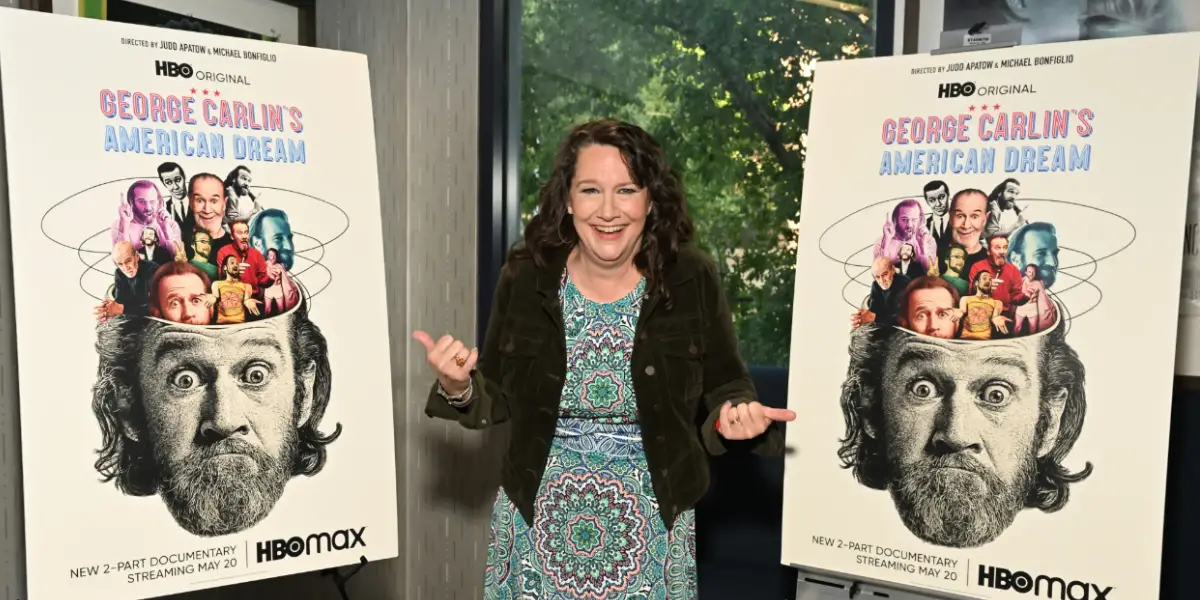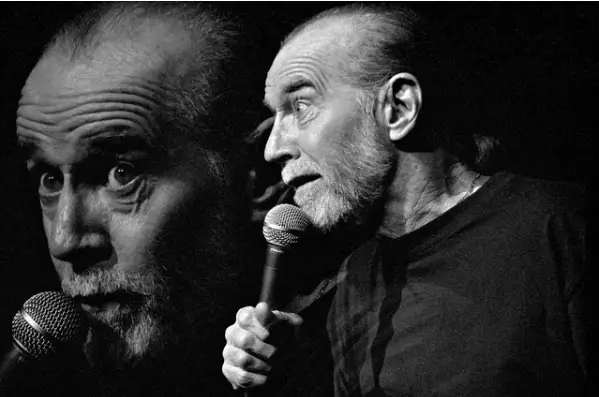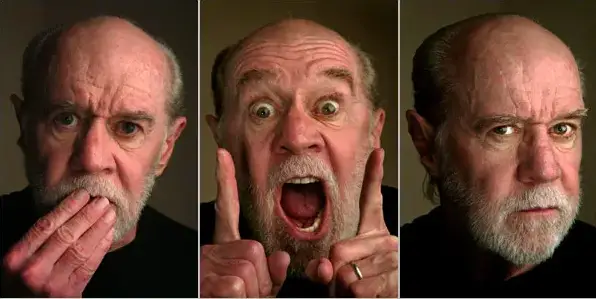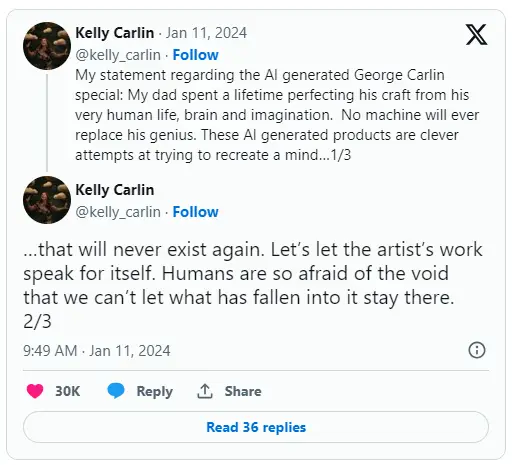George Carlin AI Special Controversy: Estate Sues Over 'I'm Glad I'm Dead' Stand-Up Show

In an era where AI tools are reshaping the landscape of various industries, the entertainment sector faces its own set of unique challenges and opportunities. The AI-generated comedy special “I’m Glad I’m Dead,” which attempts to replicate the late George Carlin’s style, serves as a prime example of this new frontier. This special has not only showcased the capabilities of AI in creating content but also ignited a fiery debate over the legal, ethical, and creative implications of using AI to mimic deceased artists. As we delve into the intricacies of this case, we confront the critical questions it raises about the future of entertainment and the preservation of artistic legacy in the age of AI.
The legal battle over the AI-generated comedy special “I’m Glad I’m Dead,” which imitates George Carlin, has sparked a significant debate about the use of AI in entertainment.
Table of Contents
George Carlin’s Estate Sues Over Fake AI Comedy Special
In a landmark legal challenge that underscores the growing complexities of artificial intelligence in the realm of entertainment, the estate of the late, great comedian George Carlin has filed a lawsuit over the unauthorized use of his work and likeness. At the heart of this dispute is an AI-generated comedy special titled “I’m Glad I’m Dead,” produced by Dudesy, a media company known for its innovative yet controversial use of generative AI technology. This special, which has garnered significant attention online, features an AI-simulated version of Carlin, replicating his unique voice and comedic style to create an hour-long performance that many have deemed a “fake” representation of the legendary comedian.
The lawsuit, filed in a federal court in Los Angeles, alleges that Dudesy’s creation infringes upon Carlin’s copyrighted materials and tarnishes his legacy. The estate argues that the special was made without permission or appropriate licenses, using Carlin’s extensive body of comedic works to train an AI chatbot, which then scripted the episode. This move, according to the estate, not only violates copyright laws but also raises serious ethical questions about the use of a deceased artist’s persona and body of work. The complaint goes further to state that the AI-generated special is a “piece of computer-generated click-bait” that detracts from the value of Carlin’s comedic works and harms his reputation, a sentiment echoed by fans and family members who view the special as a disservice to Carlin’s authentic genius. The estate is seeking unspecified compensation for damages and the immediate removal of the special, emphasizing the need to protect the integrity of Carlin’s work and the rights of artists in the face of rapidly advancing AI technology.

What is “George Carlin: I’m Glad I’m Dead”?
“George Carlin: I’m Glad I’m Dead” is an AI-generated comedy special that has sparked significant controversy and legal action. Created by the media company Dudesy, this hour-long special is a pioneering yet contentious example of how generative artificial intelligence can be used in entertainment. The special features a digital recreation of George Carlin, using AI to mimic his voice and comedic style. It was released on Dudesy’s YouTube channel and quickly attracted attention for its novel approach to content creation. The AI program behind this special was reportedly trained on Carlin’s extensive library of stand-up routines, enabling it to generate new material in his distinctive voice and style. While innovative, this approach has raised critical questions about copyright infringement, the ethical use of a deceased artist’s work, and the broader implications of AI in the realm of creative arts. The special, tackling modern topics and societal issues, has been viewed by many as a groundbreaking yet controversial experiment in the evolving intersection of AI and entertainment.
Also read:AI Brings George Carlin Back to the Stage in Groundbreaking Comedy Special
Who is George Carlin?
George Carlin was an American stand-up comedian, actor, social critic, and author, renowned for his black comedy and reflections on politics, the English language, psychology, religion, and various taboo subjects. His career spanned over five decades, during which he became known for his critical and often incisive commentary on American society. Carlin was celebrated for his ability to combine humor with intellectual and provocative content, making him one of the most influential and respected comedians in the industry. He was noted for his unique style, which often involved the use of language, wordplay, and dark humor to explore complex social issues. Carlin’s legacy extends beyond his comedy; he was a voice of counterculture and a symbol of free speech, often challenging societal norms and censorship. His work continues to influence comedians and artists worldwide, and he remains a significant figure in the history of American comedy.

The Controversy of AI-Generated Content: George Carlin's Legacy at Stake
Legal Implications of AI-Generated Content
The lawsuit against the AI-generated special “I’m Glad I’m Dead” has brought to light significant legal implications regarding AI and intellectual property rights. The estate of George Carlin argues that the special infringes on copyrighted material, as it uses Carlin’s voice and style without permission. This case could set a precedent for how AI-generated content is treated under copyright law, especially concerning posthumous use of a celebrity’s persona.
Ethical Concerns in Replicating a Comedian’s Legacy
Ethically, the use of AI to replicate George Carlin’s style raises questions about the integrity of an artist’s legacy. Critics argue that an AI cannot capture the nuances of Carlin’s genius, which was deeply rooted in his personal experiences and views. This controversy highlights the ethical dilemma of using technology to resurrect the work of deceased artists, potentially altering or misrepresenting their original intent.
Impact on the Entertainment Industry
The case has significant implications for the entertainment industry, particularly in how it may utilize AI technology in the future. While AI offers innovative ways to create content, this lawsuit underscores the need for clear guidelines and ethical considerations. The industry must balance the potential of new technology with respect for artistic integrity and copyright laws.
Public and Fan Reaction to AI Carlin
Public and fan reactions to the AI-generated George Carlin special have been mixed. While some see it as a technological marvel, many fans and comedians view it as a disrespectful and inaccurate portrayal of Carlin’s work. This division reflects the broader debate on the role of AI in art and whether it can truly replicate the essence of human creativity.

Industry and Family Reactions: Drawing a Line in AI's Use in Entertainment
Family’s Stance on Preserving Carlin’s Authenticity
George Carlin’s family, particularly his daughter Kelly Carlin, has been vocal in opposing the AI-generated special. They emphasize the importance of preserving the authenticity and integrity of Carlin’s work. Kelly Carlin’s statements reflect a deep concern that AI technology, while innovative, cannot replicate the unique and human aspects of her father’s comedy, which were shaped by his personal experiences and perspectives.
Entertainment Industry’s Ethical Dilemma
The entertainment industry is facing an ethical dilemma with the advent of AI technology in content creation. This lawsuit has sparked a broader discussion within the industry about the moral implications of using AI to replicate deceased artists. Industry professionals are now more aware of the need to balance technological advancement with ethical considerations and respect for the original artists’ legacies.
Legal Precedents and Future Implications
This lawsuit could set significant legal precedents regarding the use of AI in entertainment. It highlights the need for clear legal frameworks and guidelines to govern the use of AI in creating content, especially when it involves the likeness and work of deceased artists. The outcome of this case could influence future decisions and regulations in the entertainment industry, shaping how AI is utilized in creative processes.
The Response from Creators and the Public to the AI-Generated Special
Creators’ Defense of AI as a New Creative Tool
The creators of the AI-generated special, Dudesy, defended their use of AI, likening it to a new paintbrush in the realm of artistic creation. They argue that AI is a revolutionary tool that can be utilized across various facets of life, including entertainment. This perspective represents a growing segment within the creative industry that sees AI as an innovative means to push the boundaries of traditional content creation.
Public Debate Over AI’s Role in Art
The release of the AI-generated George Carlin special sparked a public debate over the role of AI in art and entertainment. While some audience members and tech enthusiasts praised the technological achievement, many fans and purists expressed discomfort and disapproval. This divide underscores the ongoing conversation about the limits of technology in replicating human creativity and the ethical considerations of using AI to mimic deceased artists.
Industry Professionals Weigh In
Industry professionals, including comedians, actors, and writers, have weighed in on the controversy, with many expressing concerns about the implications of AI-generated content. They highlight issues such as the potential loss of originality, the undermining of artistic integrity, and the ethical complications of using a deceased person’s likeness and style. This response from within the industry reflects a cautious approach to the integration of AI in creative processes, emphasizing the need for guidelines and respect for artistic legacy.
Conclusion
The lawsuit surrounding the AI-generated comedy special “I’m Glad I’m Dead,” which mimics the late George Carlin, has opened a Pandora’s box of legal, ethical, and creative challenges in the entertainment industry. It underscores the delicate balance between technological innovation and the preservation of artistic integrity. While AI tools offer new frontiers in content creation, they also bring forth critical questions about copyright laws, ethical boundaries, and the respect due to an artist’s legacy. The reactions from George Carlin’s estate, the public, and industry professionals highlight a collective concern for the future of entertainment in the age of AI. As we venture further into this uncharted territory, it becomes imperative to establish clear guidelines and ethical standards that honor the originality and sanctity of artistic work.

